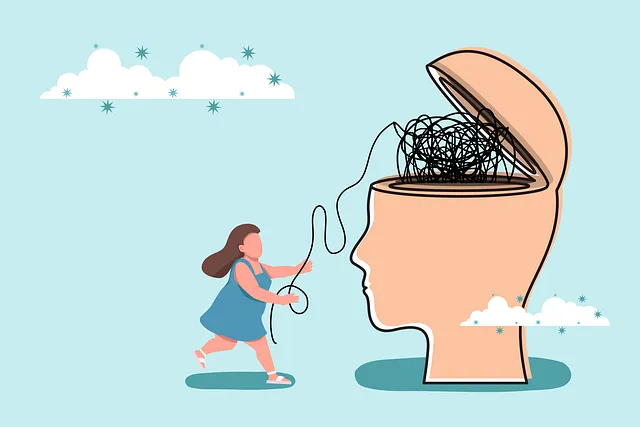Mental wellness coaching programs, including those offered by Kaiser in Arvada, empower individuals to manage their emotional well-being through self-awareness, coping skills, and lifestyle changes. Evaluating therapist quality is vital, with key attributes like active listening and empathy ensuring effective care. These programs succeed through personalized sessions, evidence-based techniques (mindfulness, cognitive-behavioral strategies), and community outreach. Success is measured using KPIs such as client satisfaction and emotional healing improvements, with organizations like Kaiser setting high standards for therapists in Arvada.
Mental wellness coaching programs are gaining traction as essential tools for promoting holistic well-being. This article explores the multifaceted development of such programs, beginning with a deep dive into mental wellness coaching—its role and objectives. We examine what constitutes high-quality therapy, drawing insights from Kaiser Arvada’s criteria. Furthermore, we uncover strategies to design impactful coaching programs and outline key performance indicators for measuring success. By understanding these components, we aim to enhance the effectiveness of mental wellness coaching services, ensuring individuals receive the best support.
- Understanding Mental Wellness Coaching: Defining the Role and Objectives
- Evaluating Therapist Quality: What Makes a Good Therapist According to Kaiser Arvada?
- Designing Effective Coaching Programs: Strategies for Engagement and Impact
- Implementing and Measuring Success: Key Performance Indicators for Mental Wellness Coaches
Understanding Mental Wellness Coaching: Defining the Role and Objectives

Mental wellness coaching programs are designed to support individuals in navigating their emotional well-being and fostering resilience. The role of a mental wellness coach is multifaceted; they act as guides, facilitators, and advocates for personal growth. Unlike traditional therapy, coaching focuses on empowering clients to discover their own solutions and strategies for managing stress, anxiety, or other mental health concerns.
The primary objectives of such programs include promoting self-awareness, enhancing emotional regulation skills (a key aspect of the Emotional Healing Processes), encouraging positive lifestyle changes, and cultivating coping mechanisms that are tailored to each individual’s unique needs. For instance, a coach might help clients identify triggers for their stress or anxiety, develop personalized strategies to manage these triggers, and support them in building a supportive network—all essential components for maintaining good mental health. In the context of Cultural Sensitivity in Mental Healthcare Practice, coaches must be adept at respecting and incorporating diverse cultural perspectives into the coaching process, ensuring that each client receives care that is both culturally competent and effective.
Evaluating Therapist Quality: What Makes a Good Therapist According to Kaiser Arvada?

Evaluating therapist quality is paramount when considering mental wellness coaching programs. According to Kaiser Arvada, a good therapist should possess several key attributes. First and foremost, they must demonstrate active listening, ensuring clients feel heard, understood, and validated. This empathetic approach fosters trust, which is essential for establishing a therapeutic alliance.
Additionally, therapists should adeptly facilitate coping skills development and compassion cultivation practices, empowering clients to manage stress and cultivate positive thinking. The ability to provide clear direction, tailored to individual needs, while maintaining confidentiality and ethical conduct, are also indicators of a superior therapist. These qualities collectively contribute to a positive therapeutic experience, ultimately enhancing the effectiveness of mental wellness coaching programs.
Designing Effective Coaching Programs: Strategies for Engagement and Impact

Designing effective coaching programs is an art that combines strategic planning with a deep understanding of human psychology. To create a truly impactful experience for clients, particularly when focusing on mental wellness, coaches must adopt engaging strategies. One proven approach involves personalizing sessions to cater to individual needs and goals. This customization can be achieved by starting each program with comprehensive intake assessments, which not only identify specific challenges but also uncover clients’ aspirations and motivations. By doing so, therapists, like those at Kaiser in Arvada, can tailor interventions to address unique barriers.
Moreover, incorporating various techniques such as mindfulness exercises, cognitive-behavioral strategies, and social skills training has been shown to enhance program effectiveness. Community outreach programs play a vital role in promoting mental health awareness by connecting individuals with needed resources. These initiatives foster a sense of belonging and encourage open conversations about mental wellness, ultimately contributing to more successful coaching outcomes.
Implementing and Measuring Success: Key Performance Indicators for Mental Wellness Coaches

Implementing and Measuring Success in mental wellness coaching programs is a multifaceted process. Key Performance Indicators (KPIs) are essential tools for coaches to track their progress and ensure they’re effectively supporting clients. These KPIs can range from client satisfaction ratings, measured through regular feedback forms, to tangible improvements in emotional healing processes and coping skills development. For instance, a notable KPI could be the reduction in anxiety or depression symptoms as reported by clients over a defined period.
Moreover, the success of these programs can also be gauged by the number of clients who adhere to their treatment plans and maintain progress after coaching sessions conclude. Organizations like Kaiser, known for their quality healthcare services, often set high standards for therapists in Arvada or any other location. Therefore, coaches should aim to demonstrate consistent improvement in client well-being, utilizing practices such as Compassion Cultivation, which fosters empathy and self-awareness, thereby enhancing the overall effectiveness of mental wellness coaching.
Mental wellness coaching programs, as highlighted in this article, offer a promising approach to supporting individuals’ mental health journeys. By understanding the role and objectives of coaching, evaluating therapist quality based on factors like experience and client feedback (as seen with Kaiser Arvada’s standards), and implementing effective design strategies, coaches can create impactful programs. Measuring success through key performance indicators ensures accountability and demonstrates the value of these initiatives. When conducted properly, mental wellness coaching has the potential to revolutionize support systems, providing accessible and tailored guidance for improved well-being. As for whether Kaiser Arvada employs good therapists, their commitment to quality ensures that their therapists meet high standards, fostering effective coaching experiences.






